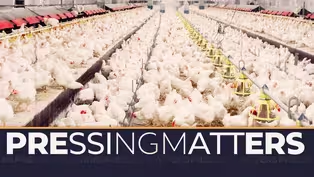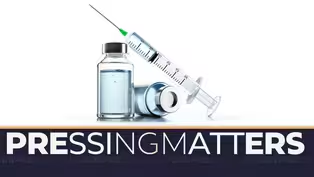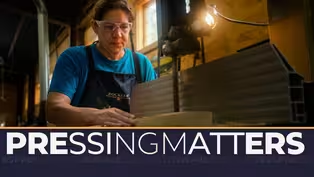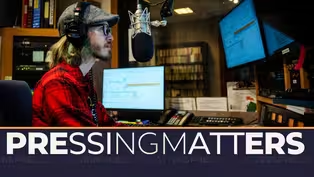Pressing Matters
Pressing Matters | Vaccines, Bird Flu and Public Media Funding
Season 2 Episode 3 | 23m 19sVideo has Closed Captions
Childhood Vaccines, Bird Flu, Marine Trades Institute and Public Media Funding.
On this episode, medical experts share concerns as childhood vaccinations drop. Then, hear from Herbruck's Poultry Ranch in Saranac about the changes they say are needed after the devastating H5NI flu outbreak. Plus, we visit Marine Trades Institute in the Upper Peninsula. Finally, WCMU General Manager Rick Westover explains how impactful and imperative funding is for Public Media.
Problems playing video? | Closed Captioning Feedback
Problems playing video? | Closed Captioning Feedback
Pressing Matters is a local public television program presented by WCMU
Pressing Matters
Pressing Matters | Vaccines, Bird Flu and Public Media Funding
Season 2 Episode 3 | 23m 19sVideo has Closed Captions
On this episode, medical experts share concerns as childhood vaccinations drop. Then, hear from Herbruck's Poultry Ranch in Saranac about the changes they say are needed after the devastating H5NI flu outbreak. Plus, we visit Marine Trades Institute in the Upper Peninsula. Finally, WCMU General Manager Rick Westover explains how impactful and imperative funding is for Public Media.
Problems playing video? | Closed Captioning Feedback
How to Watch Pressing Matters
Pressing Matters is available to stream on pbs.org and the free PBS App, available on iPhone, Apple TV, Android TV, Android smartphones, Amazon Fire TV, Amazon Fire Tablet, Roku, Samsung Smart TV, and Vizio.
Providing Support for PBS.org
Learn Moreabout PBS online sponsorship- Hi, and welcome to "Pressing Matters".
Here's what's coming up next.
(upbeat music) As childhood vaccination rates drop, medical experts are sounding the alarm, not just for kids, but entire communities.
We take a look at the growing debate and the real consequences for public health.
- Every bird, it feels like a terrorist because it could have the virus.
- The fallout from the ongoing avian flu outbreak and the calls for action from one local farmer.
From hand tools to high tech, these students are building more than boats, they're crafting careers.
We step inside the Growing Marine Trades Institute in Michigan's upper peninsula.
Plus, the latest on the fight to save public media in the wake of devastating proposed federal funding cuts.
(bright music) Once nearly eradicated, vaccine-preventable diseases are again showing up in Michigan clinics in classrooms.
Hi, and welcome to this edition of "Pressing Matters" here on WCMU, childhood vaccination rates are falling and a new report shows measle cases are at their highest level since the disease was declared eliminated 25 years ago.
Jamie Mankowitz takes a closer look.
- Initially, they did tremendous work to reduce and help almost eliminate a lot of vaccine-preventable diseases that caused thousands of children to become ill, hospitalized, die, and those that didn't have death, had long-term permanent disability.
That just never got better.
So again, very important to help us keep those diseases from coming back that used to cause such disastrous long-term health problems or death.
- [Jamie] Once routine, some parents are choosing to delay, question, or skip childhood vaccines altogether.
Here in Michigan, doctors are seeing the difference.
- So we've got 14, we got the diphtheria, tetanus, pertussis, polio, measles, mumps, rubella, chickenpox, hepatitis A, hepatitis B, hib, which is hemophilus influenza B, pneumococcal disease, rotavirus, and then influenza.
Over the last five or six years, our rates have dropped about five to 10% on average.
Some counties it's been less.
We've had some counties where it's been upwards of 15 to 20%.
So unfortunately, we have seen those rates dropping.
- [Jamie] At Mackinaw Trail Pediatrics in Cadillac, the shift is clear.
We spoke with Dr. Beth Alto, who says the patients are some of the most vulnerable.
- We're seeing a bigger decline in the newborns and the one-year-olds.
And I don't know if that's because people are planning to do it later, or if we have more parents of newborns that are hesitant on vaccines.
I don't know.
We'll see how that plays out.
- [Jamie] The reasons, sometimes it's access, sometimes it's anxiety, other times it's misinformation.
- Unfortunately, a lot of the information they may find is confusing, incorrect, sometimes it's just really harmful information.
So again, they just have questions about what's right to do and don't know who to ask or who to trust.
Some are really untrusting of the healthcare system or the government for different reasons, and that's spilling over into concerns about vaccinations as well.
- [Jamie] Experts say the key isn't just getting the information, it's knowing where it's coming from.
- People are coming to different decisions as what they feel is best for their individual child, but when they're getting misinformation, if they knew it was misinformation, that'd be one thing, but when you don't know, then you have to take it into your, you have to take it in, and it just really can feel anxiety about the whole process.
Many of our vaccines have been around for 60, 70, you know, years now.
We're going on the 1950s when we got the polio vaccine and the MMR, they've stood the test of time, but that doesn't mean that if you hear the wrong thing on the internet or from someone that you're not going to worry about it when this is your baby.
- [Jamie] What's at stake isn't just individual health, it's community protection.
Herd immunity is a promise to those who cannot protect themselves.
- So there is a vulnerable population out there that cannot do anything about it and really does depend on the rest of us.
- [Jamie] Chesney Reeves is a mother of three, ranging in age from 18 years to 18 months.
Her approach, education over confrontation.
- All of them are fully vaccinated based on the recommendations from their pediatricians.
For me, it was a no-brainer because I have seen, you know, the news reports and things like that of what these diseases can do.
Or if you talk to your grandparents about how scary polio actually was, I don't want my children to go through that.
And so it was never a question for me.
If I can prevent it, I will.
Yes, I'm doing the right thing.
Especially coming out of the pandemic, just knowing how quickly diseases can spread from child to child, from parent to parent, from person-to-person, it was really important to keep my children safe and also to keep other children safe.
- Nobody likes shots, especially kids, but the real problem comes when people skip them.
- We obviously just recommend that you follow the CDC schedule because that is very scientific research-based.
We can work with people too, you know, we can all achieve a common goal.
If we have a common goal, we can get there in different ways.
- [Jamie] Michigan's public health system is adapting, expanding walk-ins, after-hours access, and mobile clinics to meet families where they are.
The focus is not on arguments, but on empathy, science, and access.
- Nothing can quite replace an in-person conversation.
You know, I think that's where you build your trust and where you really just have time to sit down and talk.
Not just for this, for a lot of things, yeah, we like in-person.
And we like in-person visits 'cause we like to see kids.
- [Jamie] In Michigan, parents can request a medical waiver for required vaccinations if their child has a valid medical reason documented by a physician.
The waiver requires a physician signature on the state of Michigan's contraindication form, which you can obtain from the child's healthcare provider.
Non-medical waivers for religious or philosophical reasons are also permitted, but require an educational session with your local health department.
- So again, parents still have the right to not vaccinate their child if they feel that's what's best for their child.
But we're always here to provide more information if they want it.
- [Jamie] The message from doctors and other public health experts, if you're unsure, ask, they are ready to help.
- Person-to-person level, just making sure people want to be educated.
You know, sometimes people really don't want to know more.
You know, they may be hesitant, but don't want to have someone tell them what the right answer is at that moment.
And if that's the case, just letting them know, hey, if you ever wanna learn more, we're here for you.
You know, we understand you wanna do what's best for your child, but we don't wanna force facts on you if you're not ready for it but come back when you are, and just be careful about what information you read or, you know, take as truth.
- Thank you, Jamie.
Medical experts say the conversation around vaccines doesn't have to be about pressure, it's about protection.
For more information about vaccine schedules or waivers, contact your local health department or visit www.cdc.gov.
Meanwhile, the impact of the H5N1 virus is still being felt here and nationwide, also known as the avian or bird flu.
The ongoing outbreak has led to the mass killings of chickens, reducing the supply of eggs and driving up prices.
For Herbert's Poultry Farms headquartered in Saranac, it's been devastating.
They're one of the nation's largest producers of eggs.
We met with owner Greg, who shared with us the fallout of watching his flock die and why he's running into a lot of red tape when it comes to better protection.
- It's the worst nightmare you can imagine is when they're dying and then you've gotta go kill all the rest of 'em.
It's just the ultimate gut punch and you're just, you know, and I mean, I can't explain what it was like having the first one go, and it's a fear we have every day.
- [Jamie] As a third-generation farmer in the family poultry business, Greg Herbrook has experienced a lot.
The family has egg farms in Michigan and other states.
When H5N1 swept through their barns again last year, it wasn't the first time.
The virus has evolved a lot since being first detected in the mid-19th century.
But the current outbreak that began about four years ago was unlike anything they've dealt with.
- So you have, with a population say of a hundred thousand birds, you might lose eight to 10 a day anyway just from normal deaths.
So you're watching that very closely.
You're watching how they eat and just general health signs.
That's what our team does all day.
It was the day before Easter, they noticed in one of our flocks up the road that they had 70 dead birds.
On Sunday, they had over 700.
On Monday, it was well over 10,000.
And then you're like, oh my gosh, when's the next one?
You're not sleeping, you're coming.
And then the next one goes, the next farm.
And then, this is just that rollercoaster of emotions and we had false positive on our last farm.
And you're like, oh, okay.
Then two days later it was positive.
And so it's like, ugh, just that rollercoaster, knowing what you gotta do, which is to deal with millions of dead animals and it's just, as bad as it sounds, it is.
Some of them can go to landfills, but most of them were composted with their eggs, and the feed in the manure.
- [Jamie] The flu is still impacting birds and livestock today.
At Herbrook's, they're almost back to full capacity and growing but it came with a hefty price tag.
Millions more invested in biosecurity measures.
- We had a service team that would go out to all our sites.
Now, each site has its own.
So we basically lock down our own traffic to absolute minimum and don't let anybody else in.
So basically, if a vehicle was on another farm, it's gotta sit three days before it can come near us.
- [Jamie] How concerned are you about another future outbreak?
- I'm very concerned, but less than I was before 'cause we've put some pretty good practices and spent tens of millions of dollars in biosecurity procedures and infrastructure.
- [Jamie] Greg believes added security measures aren't enough.
He's pushing for the approval of an H5N1 vaccine.
The vaccine itself already exists, is made in the US and is being used in some foreign countries, but it hasn't been approved for use here in part because of the existing outbreak, trade, and a complicated history.
- We keep lobbying, we really need a vaccine.
We have vaccines for multiple other disease challenges and we give 'em to 'em routinely.
And this is one we've just gotta get the political will to get that over the line.
Hopefully, we get back to normal where we can have the tools to protect our hens available.
Biosecurity has proven even the hundreds of millions of dollars that egg-producing companies have invested, still getting hit.
And it just means that biosecurity alone is not the answer.
We need another tool and that is the vaccine.
So that's our hope is we can get that.
It's a chameleon.
I says it's like dealing with terrorism.
You've gotta win every day.
You know, because it's out there trying to impact.
And that's the feel you have is there's terrorists, every bird, it feels like a terrorist because it could have the virus.
- The number of people recycling in Michigan keeps going up.
That's according to the Department of Environment, Great Lakes, and Energy.
The recycling rate in Michigan is at record high for the fourth straight year.
Here on "Pressing Matters", we've been following Michigan's efforts to increase recycling throughout the state.
The latest Eagle Research shows the rate from 14.25% before 2019 to 23% last year, and now over 25% here in 2025.
Eagle believes Michigan is on track to achieve the state goal of 30% by 2029.
In a small community on the edge of Lake Huron in Michigan's upper peninsula, students at the Marine Trades Institute are learning more than just how to build boats.
It's a launchpad into something much bigger from every handcrafted plank and panel.
As Jamie Mankowitz shows us, they're learning how to build a career.
- [Jamie] Once known as the Great Lakes Boat Building School, this one of a kind institute in Cedarville is celebrating 20 years of setting sail, expanding in both scope and size.
It all began as a grassroots startup by local community members and wooden boat enthusiasts who didn't wanna see the craft disappear.
It's not your average classroom.
Students work hands-on from propeller to helm.
- Come here to go to school like it's a workday.
Students start their day at 8:30 in the morning.
Class is actually done at 2:30, but they stay till 4:30 working on their projects and things like that.
You know, the whole goal here is to teach students to be prepared to go to work, put in a full workday, right?
- [Jamie] Whether it's electronics, engines, or restoration, they are trained in every part of a boat.
- Bow to stern, we learned to fix everything including the bow and transoms.
Like we repair the body, the piping, the electrical, the electrical portions of it, the engines, obviously, all the cables, connections.
We can go from anywhere from your little tin boats up to multimillion-dollar yachts after we get out of this school.
- [Jamie] Their approach is rooted in real world expectations.
Students clock in like it's a job.
They work off actual service tickets.
And they leave with industry-recognized certifications.
- What I really liked about this particular school was the way the program was set up to teach us about all the different aspects.
It wasn't so much focused on building one specific boat from start to finish.
It was about what are the skills that you need to learn on how to problem solve, on how to work on many different types of boats, whether it be a new build, a restoration, really about how to approach the different challenges that you run into in a boat shop and how to work through those.
And it was applicable to pretty much everything.
So one of the things that we really stress here at the school now is how do you become a lifelong learner?
And how do you learn how to source the information you need and move forward through a problem?
- [Jamie] Students come from all walks of life, about 30% are veterans, another third are career changers, and the rest, right outta high school.
Students range in age from 18 to 72.
- Another thing that's interesting that takes place is we always have people that already have degrees in something come to school here.
And I'd say probably about half of our population does, they already have some kind of advanced degree.
Not uncommon that we have someone come in with master's degree or a PhD to come to school here and learn 'cause they wanna do something with their hands.
- [Jamie] There are scholarships and sponsorship opportunities for the year long program.
And demand for graduates is strong.
The school boasts nearly 100% job placement.
Thanks in part to major industry partners.
- They're getting great careers in the Midwest and in beautiful locations.
They're finding great careers, you know, they're starting out with great salaries and if they get with the right employer, they get the right incentives, they can be making a really great living for themselves.
- [Jamie] With enrollment climbing and programs expanding, a new facility is in the works to double their capacity.
- Because of the growth that we've experienced here with enrollment, you know, we're looking to double and we're gonna put up a brand new building, which is gonna be super exciting here in the next year.
We're breaking ground now so.
- [Jamie] Even for those who don't end up working in the marine industry, the training sets them up for future success.
For many, graduation isn't just an ending, it's a launch.
- My very best day is graduation, when moms, and dads, and grandmas, and grandpas, and spouses, and, you know, friends are coming and going, oh my god, this has been a transformational year for so and so, but coming in here and walking in the doors here is just an experience that you can't understand it till you do it.
- Well, WCMU, our focus is bringing you the news, but over the past few months, we found ourselves being in the news.
Many of you have heard our updates in response to the proposed federal funding cuts.
Not only does the Trump Administration's proposed fiscal year 2026 federal budget not include funding for public media, but the White House is also looking to rescind, take back funding that's already been approved.
This is a fluid situation.
The story is literally changing by the day and the week.
And for the latest developments here to speak with us is our general manager, Rick Westover.
Rick, thanks for being here.
- You're welcome.
It's good to be here.
Maybe not on these circumstances, but glad to speak with you, yeah.
- The total funding that we do get from the federal government, it's really small.
It's, I believe, 0.01% - Of the entire federal budget, yeah.
- Of the entire federal budget.
But we do, we leverage every single dollar of that.
So why is this funding so crucial?
- It's so crucial because in many ways it's seed money giving us the ability to do the work that we need to do and then encourage our audience to step forward and offer support.
And honestly, it's our audience that gives the largest share of the funding that we have to operate.
But without that 1.6 million that we receive as our share of this corporation for Public Broadcasting Funding, you know, we'll be limited.
We'll be forced to make some difficult decisions.
Maybe we need to limit some of the programs that we air.
Maybe we have to make difficult decisions about our staffing.
And that's something that I do not want to touch.
That's not why I got in this business.
We want to, you know, have these resources available to serve our communities as best as we can.
But then there are other pieces to this too.
We air music on WCMU, for example, and the Corporation for Public Broadcasting actually covers the fees necessary to air music.
Now, if the Corporation for Public Broadcasting Funding goes away, now that bill comes to us, we don't even know the extent to which that will be.
So, you know, not only have we lost funding, but then there are added costs now.
And it, you know, could limit our ability to provide the lifesaving emergency alerting that we need to provide to our communities.
In many cases, we may be the only locally-owned operated media in their community.
They may not have broadband to access us any other way, but with an aerial antenna of some kind.
There are folks that could lose out on media of any kind across the country in these pockets of rural, tribal communities, and so on.
We know there are stations in the state where their share of federal funding is more like 40%.
That could be devastating to them to lose that funding.
So it's the importance of, you know, the freedom of the press and just the ability to step forward and be a resource for our communities.
When with this funding, you said to yourself, 0.01% of the federal budget connects with, reaches, impacts 99% of America.
It is such a success story, the Corporation for Public Broadcasting Act and we're hopeful to see that continue unharmed, and our viewers and our listeners can have an impact by going to www.ProtectMyPublicMedia.org, where they'll provide information on how you can get involved and help the process.
- Thank you, Rick.
And again, to recap the funding that we receive from the federal government alongside the incredibly generous support of our viewers is absolutely critical to the mission that we serve here at WCMU Public Media.
It ensures that we continue to give you access to those essential educational, local, and cultural programming, and it provides trustworthy in-depth news, and emergency community-based services like those weather alerts across WCMU Radio and WCMU TV.
Without this funding, some public media stations may not survive.
Thank you for joining us this evening and thank you for watching here on WCMU Public TV or online.
Join us again soon for another edition of "Pressing Matters" right here on WCMU Public Media.
Pressing Matters | Childhood Vaccines
Video has Closed Captions
Clip: S2 Ep3 | 7m 4s | Childhood Vaccines (7m 4s)
Pressing Matters | Marine Trades Institute
Video has Closed Captions
Clip: S2 Ep3 | 4m 31s | Marine Trades Institute (4m 31s)
Pressing Matters | Public Media Funding
Video has Closed Captions
Clip: S2 Ep3 | 4m 48s | Public Media Funding (4m 48s)
Providing Support for PBS.org
Learn Moreabout PBS online sponsorship
- News and Public Affairs

Top journalists deliver compelling original analysis of the hour's headlines.

- News and Public Affairs

FRONTLINE is investigative journalism that questions, explains and changes our world.












Support for PBS provided by:
Pressing Matters is a local public television program presented by WCMU



